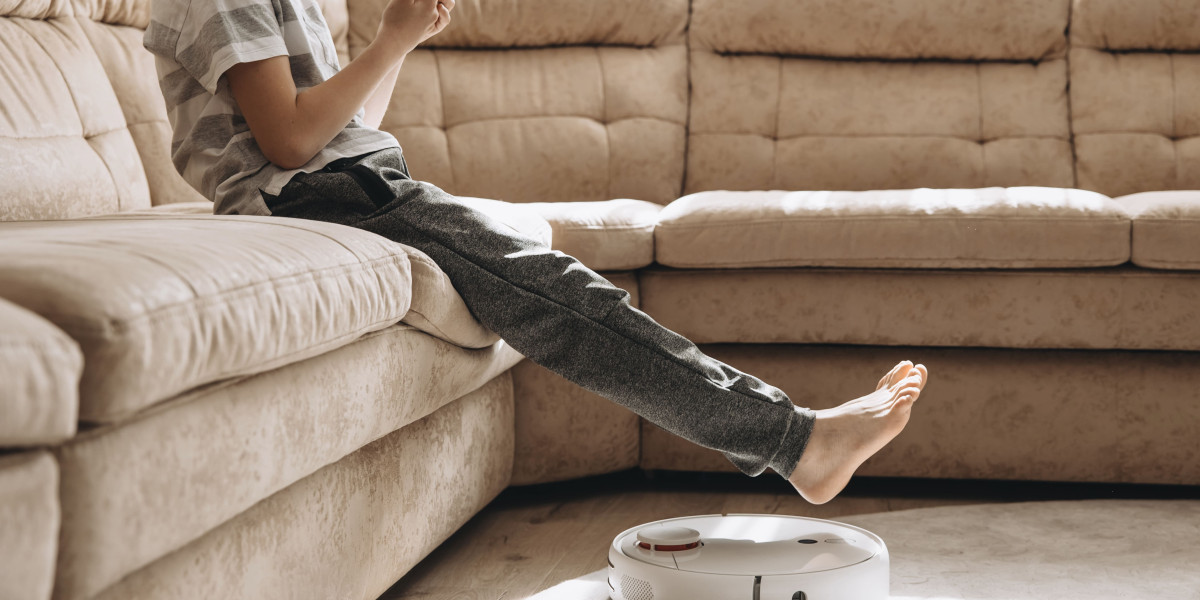A robot mop is a cleaning machine which can vacuum and mop floors without harming carpet. They are made for hard surfaces, such as vinyl, tile, and some wood floors.
 The majority of models have an underside that houses an empty tank for clean water, and another for dirty water. The tanks need to be regularly filled and emptied. They must also be charged and have their cleaning pads removed or replaced.
The majority of models have an underside that houses an empty tank for clean water, and another for dirty water. The tanks need to be regularly filled and emptied. They must also be charged and have their cleaning pads removed or replaced.Floor type
Some robot mops use a cleaning solution to eliminate any debris that has gotten stuck. Others scrub the floor with pads. Some robot mops have rotating pads or other features that aid in cleaning more thoroughly. Although the majority of robots are capable of maneuvering and getting around obstacles, they can be confused or tangled in rooms that have a lot of furniture. Choose a model that can pause or return to its base to recharge and then resume the job where it left off.
In addition to mopping, some robot mops can also vacuum as well. They are ideal for hard surfaces such as tiles, vinyl, stone, and hardwood. Some can also be used on carpets and rugs however they are less effective than vacuum cleaners that are specifically designed for this purpose.
These robots usually come with a separate dust bin and water reservoir, which must be filled and emptied regularly. You should also empty the dirt bin, and wash and dry the mop pads between use. You might want to consider a hybrid vacuum that is a mop and the vacuum, which can be controlled using an app.
Hybrid mop-vacuums aren't quite as effective as the dedicated robot vacuums, however they are still able to clean floors between cleaning sessions. This makes them a great investment for most homes. Some models can perform dry sweeps prior to mopping. This helps remove particles that are floating around and prevents clogs from occurring.
Some robots can detect carpeted areas and steer clear of them, while others are programmed with the ability to lift the mopping device when they see a carpet. Some robots can be programmed to only mop in designated areas, which will save you the hassle of having to reset the robot.
If you decide to go with a dedicated robot mop or a hybrid vacuum-mop make sure you choose one with a long battery life and suction power that is strong enough to keep your floors tidy for longer. Find a navigation system that can navigate around obstacles and distinguish between rugs and hard flooring. Also, an app that allows you to plan or modify cleaning schedules is a great idea.
Water level
Robotic mops have to be regularly refilled and cleaned to ensure that the water level in the tank is crucial. It's also important to take into consideration the amount of floors in your home and the frequency you'd like your robot to clean them. If you have pets or children in your home, you may need to clean the floors more often than they are not.
Sensors on the most sophisticated robot mops are said to allow them to differentiate between different types of flooring. Some robot mops detect carpets so that they don't soak in cleaning solution. Sensors aren't foolproof. For instance, I tried two robotic mops - the Ecovacs Deebot T30S and Yeedi M12 Pro+ - on carpets, and both bots started mopping the floor near the edges of the rug leaving the entire floor damp. This is especially problematic if the floor was covered in coffee, urine or brightly colored drinks.
Some of the most expensive models are capable of performing multiple tasks such as cleaning and vacuuming. Certain models can be programmed to complete several tasks, like mopping the dining area, and then vacuuming the playroom. However, these robots can get very confused and lose their way, so it's important to remove your home of obstacles before you begin.
The majority of robot mops come with a pair of tanks, one for clean water and the other for dirty water. These tanks are inside the base station, along with an empty bin for vacuum only robots. The tanks must be emptied and filled up regularly, but some of the most recent models we tested include features to facilitate this process.
 Some mop cleaners come with cleaning solutions prepared to be used instead of water in its plain form. It's not a good idea to add a cleaner into your robot's water tank, though, as it can cause damage to internal components. If you decide to try an alternative to water, check with your manufacturer first.
Some mop cleaners come with cleaning solutions prepared to be used instead of water in its plain form. It's not a good idea to add a cleaner into your robot's water tank, though, as it can cause damage to internal components. If you decide to try an alternative to water, check with your manufacturer first.Removal of debris
Robotic mops usually have reservoirs you need to fill with water or cleaning solution microfiber cloths to scrub your floors and pick up dirt, and sensors that guide them around furniture. Some robot mops, such as the iRobot Braava Jet m6, are able to clean floors and vacuum them in one clean. If you're looking for an easy mop or vacuum-mop combo, we have a recommendation for you that fits your cleaning style and budget.
During our tests this robot cleaned floors quickly and thoroughly. It was able navigate all our obstacles without getting caught. Additionally, the app let us program and alter mopping and suction power as well as dispensing water and cleaning products. Its multi-room smart mapping technology mapped the entire floor of our testing room and www.robotvacuummops.Uk created a plan to effectively clean each area. This feature is available on all of our recommended robots and can significantly improve their cleaning and navigation capabilities.
While you could pour a small amount of Pine-Sol in your robot's water tank however, it's not recommended as it may damage the internal parts. Instead, choose an established brand that produces floor cleaners specifically formulated for robots. These products will not be a problem for your warranty and are gentle on your flooring.
During its testing, this machine mop is able to clean all types of flooring with ease and efficiency. Its dual spinning mop pads can raise and lower themselves when they come into contact with carpet. This allows it to remove pet hair, as well as other hard-to-get rid of particles. Crevices were no problem, and it even emptied its trash bin and removed the brush roll of pet hair without clogging. This model is one of the most simple models to use, and the best choice for pet owners who are looking for a high-quality clean machine.
Although the initial cost of a robot mop is greater than that of an upright or canister vacuum, its long-term benefits are worth the investment. You'll spend less time cleaning and won't have to be concerned about replacing parts or making repairs. Furthermore the robotic mops' high-tech technology and automated functions are more efficient than traditional mop and bucket combinations.
Cleaning time
A robot mop is a great addition to any routine for cleaning your home. Although it will not save you from having to do one-off deep cleaning every once in a while, it can make the task quicker and simpler. There are a few aspects to consider before purchasing one.
First, you should look for a mop that has an extended battery life. You need to choose one that can be recharged quickly. The majority of robotic mops last about an hour with a single battery charge. Also, ensure that you use the right cleaning pads for your floors. Many robot mops come with special pads for hard floors and carpets however, you can also use regular mops as well. You can also purchase pads that wash and reuse.
Several of the models we tested have an application that allows you to create maps of your home and set cleaning schedules. Apps can help you adjust the amount of water or scrubbing force that the mop uses. You can also make "scenes" that are combination of settings for vacuuming and mopping. The robot will follow these while it's operating. For instance, you can, tell your robot to clean the kitchen first, and then mop the living room.
Some of the newer robot mops are also able to double as vacuum cleaners, which could be helpful if you have carpets. If you are looking for models that can do this, make sure to read reviews to determine if it's suitable for your carpet and has a powerful suction. It's a good idea pick a mop with a robotic design that can easily change modes.
Robotic mops that also clean their own mop heads is an added benefit. This will help to prevent bacteria from growing on the mop and spreading around your home.
The water tanks of many robot mops are prone to becoming dirty, which is why you'll have to clean them thoroughly every week at a minimum. You'll need to clean the trays they sit on between mopping cycles.







